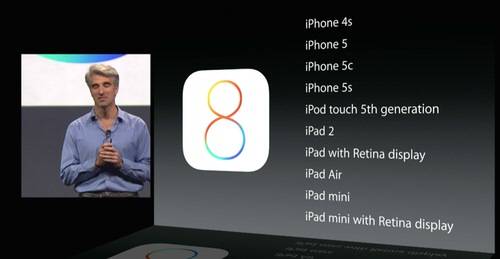At Monday’s keynote at the Worldwide Developers Conference, a showcase for its latest software, Apple executives didn’t drop a hint of “one more thing,” as the company’s late cofounder Steve Jobs used to do years ago. But there was indeed one more thing—a bit of bad news for owners of older Apple phones.
When Craig Federighi, Apple’s software chief, pulled up the names of devices capable of running iOS 8, the next mobile software for iPhones and iPads set to launch this fall, the iPhone 4 was not among them, MacRumors noticed.
The iPhone 4, which more or less defined a look for modern iPhones that Apple has only subtly tweaked, sold 1.7 million units in its first three days on sale in 2010, and continued to sell briskly alongside more modern models, especially in price-sensitive developing markets.

iPhone 4geddaboutit
The list of iOS 8-capable devices Federighi displayed at WWDC included:
- iPhone 4s
- iPhone 5
- iPhone 5c
- iPhone 5s
- iPod touch 5th generation
- iPad 2
- iPad 4
- iPad Air
- iPad Mini
- iPad mini with Retina Display
This is not entirely a surprise. The iPhone 4 had trouble running iOS 7. It’s three generations behind at this point. Apple released software tweaks under iOS 7.1 to address some of those performance issues for the iPhone 4, but the company appears to be cutting the gadget loose now.
Apple will continue supporting the iPhone 4s, which it still sells at retail, even though it, too, had trouble dealing with iOS 7.
In some emerging markets like India, Apple reintroduced the iPhone 4 as a low-end device to compete with cheap Android smartphones. It discontinued the device once more in May, according to reports, though some Apple resellers apparently still stock it.
What About The 4S?
If you have an iPhone 4, it’s time to face facts: Your phone is not going to benefit from any of the new software improvements Apple’s bringing out. If you mostly use it for texting, email, and Web browsing, that may be fine. But if you’re a heavy user of popular apps, you may find that you’re missing new must-have features in the apps you love.
The only way you’ll get the changes Apple just unleashed—including changeable keyboards, revamped Messages and the new Health app, among other things—will be to purchase a new handset.
If you have an iPhone 4s, you’ll want to think long and hard about updating that phone when iOS 8 comes out—because those updates may come at a cost to performance that you find unacceptable.
If you think about it, dropping support for these earlier models is a clever way for Apple to get hardware laggards to upgrade their devices in the otherwise-slow summer months before it’s set to unveil new phones, as Apple typically does in the early fall.
Photo by William Hook; image of Federighi via Apple

















